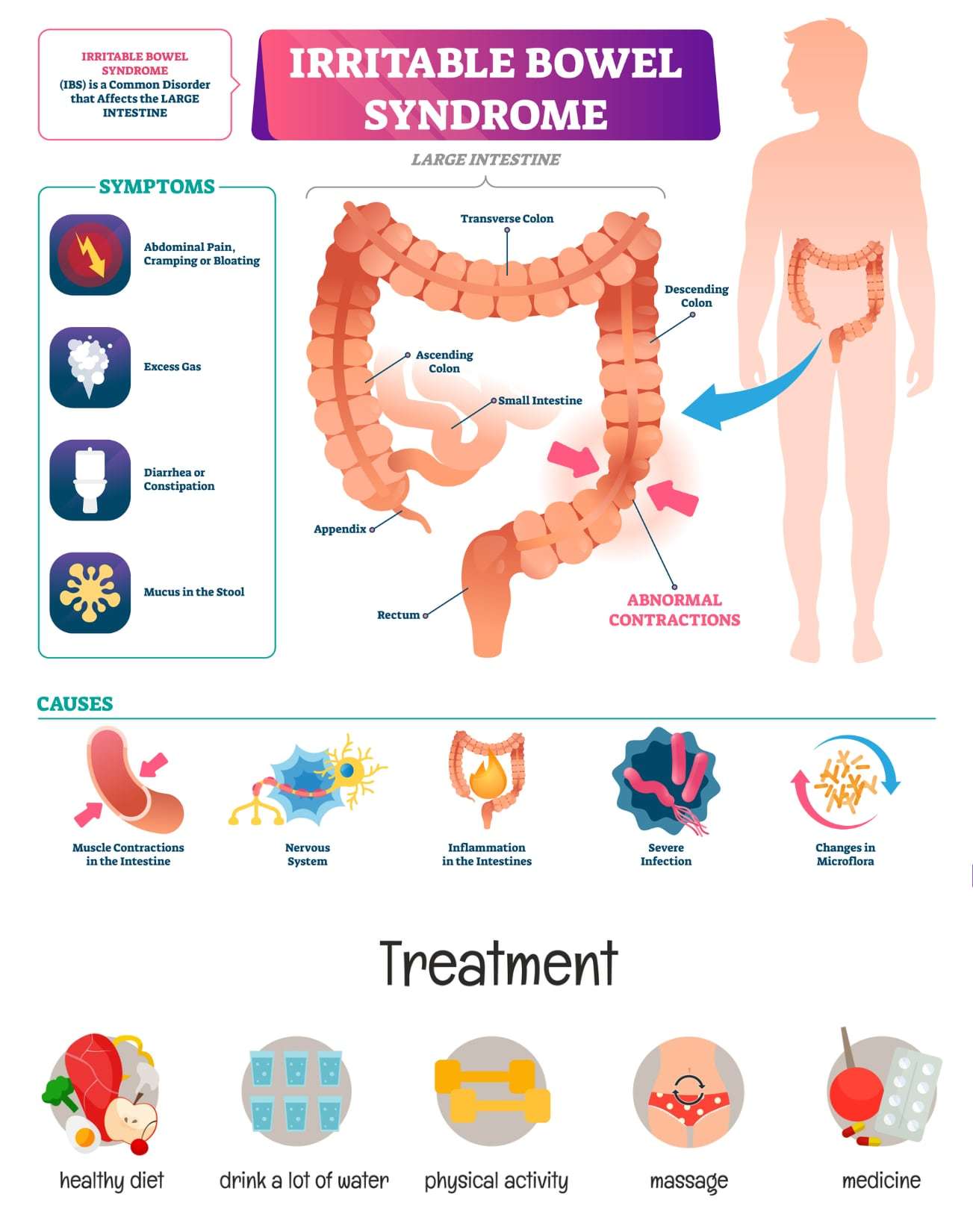Irritable Bowel Syndrome
Irritable bowel syndrome (IBS), also referred to as mucus colitis, nervous colon, and spastic colitis is a long-term chronic gastrointestinal disorder that can cause continuous discomfort.
The condition affects between 6 to 18 percent of individuals from across the world. Women are the most affected and are likely to get this condition in their late teens to early 40s.
IBS is not a life-threatening disorder, and it doesn’t make you vulnerable to other colon conditions such as colon cancer, ulcerative colitis, or Crohn’s disease.
IBS is more likely to affect individuals’ day to day lives, and they may feel less enthusiastic about daily activities. Some people have to completely alter their work setting: changing work hours, shifting to work from home, or not working at all, when the discomfort is more.
What Are The Symptoms Of IBS?
People with IBS may suffer from the following symptoms:
- Diarrhea
- Constipation
- Nausea
- Abdominal pains and cramping, usually in the lower part of the abdomen, that are likely to worsen after meals and improve after a bowel movement
- A lot of gas or bloating of the abdomen
- Harder or looser stools than usual
- A sudden urge to go to the bathroom
- An altering pattern of constipation and diarrhea
- Passing of mucus from the rectal area
- Food intolerance
Individuals suffering from IBS will experience a mix of symptoms such as belly discomfort or pain and trouble with bowel activity (constipation or diarrhea). However, symptoms tend to change over some time. A flare-up may last for several days, weeks, or months at a time, and then either improve or resolve entirely.
Signs and symptoms may vary from individual to individual and at times may resemble symptoms of other disorders and conditions, including:
- Frequent headaches
- Persistent fatigues
- A sudden, urgent need to urinate
- Joint or muscle aches
- Irregular menstrual cycleOnion

- Dyspareunia
- Halitosis
- Psychological disorders such as anxiety and depression are also likely to occur to individuals, often due to the discomfort or embarrassment that arises because of IBS.
- What Are The Causes Of IBS?
The exact cause of IBS is not known to doctors and health specialists. Several factors, including alteration in the gastrointestinal tract, food intolerances, abnormal nervous system signals, and hypersensitivity to pain, are believed to be the causes of irritable bowel syndrome. Some of the risk factors that are found to cause IBS are mentioned below:
- Increased sensitivity to pain from gas or a full bowel
- Small intestinal bacterial overgrowth (SIBO)
- Environmental factors, such as stress
- Food intolerances, likely because of poor absorption of acids or sugars in food
- Abnormal nervous system signals or abnormal levels of reproductive hormones
- Gastroenteritis (a viral stomach and gut infection caused by the presence of harmful bacteria)
- Abnormal movements of the small intestines or colon
- A person’s psychological and emotional state can lead to the development of IBS. Depression or anxiety may occur in many people with IBS, although these disorders are not directly linked to IBS.
- Genetics is believed to be a likely cause of IBS but has not been scientifically proven.
Does Diet Play Any Role In IBS?
Dietary factors play a significant role in IBS. Symptoms are likely to worsen after consumption of dairy products, chocolates, or alcohol, thereby causing either constipation or diarrhea. Besides, some fruits and vegetables can cause bloating of the stomach and pains. It is not yet clear whether a food allergy or intolerance triggers IBS.
Mentioned below are some of the most common dietary triggers of abdominal bloating or cramping foods:
- Onion
- Brussels Sprouts
- Carrots
- Prunes
- Beans
- Raisins
- Celery
- Bananas
- Pretzels
- Apricots
- Bagels
- Other foods that can contribute to IBS develops are:
- Dairy products
- Candies and chocolates
- Caffeine-based products, possibly due to caffeine, sugar or sorbitol intolerance
- Sugar-free gum
- Individuals can take the following dietary steps to reduce the risk of a flare:
- Increasing the intake of fiber in diet: Individuals with IBS need to consume food products with more fiber content, while others should reduce their consumption. Balanced fiber levels in the diet can promote healthy digestion.
- Maintaining a food diary: People should keep a log of specific foods and their physical effects on the person, thereby helping them identify primary trigger foods.
How Is IBS Diagnosed?
IBS is diagnosed by excluding other gastrointestinal conditions that have result in the occurrence of similar symptoms. An individual is required to undergo a thorough check-up to determine the duration and the severity of symptoms. The duration of the symptoms needs to be monitored before concluding. The symptoms last at least six months and should occur at least three times a month.
A person may have to undergo particular tests, including CT scans, stool tests, or blood tests for proper diagnosis of IBS. There is no specific result on these tests, but other conditions can be diagnosed by performing them if there are any.
Irritable Bowel Syndrome Test
Diagnosis of IBS involves two relatively new blood tests, out of which, one is for IBS with both diarrhea and constipation (Irritable Bowel Syndrome Mixed IBS-M), and the other is for irritable bowel syndrome with diarrhea (IBS-D). Besides, either test cannot diagnose irritable bowel syndrome with constipation (IBS-C).